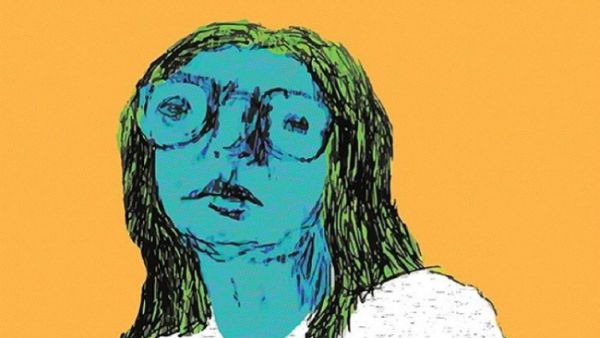Index:
Interview Part 1: On Hello Psychaleppo, Arabic Music, and Life Abroad
Interview Part 2: On the Next Album
Yazeed: [Regarding the war], would you say your music was inspired by the Syrian war?
Karim: Like maybe on the next album?
Not really. With everything that’s happening, especially the last seven years…as soon as I go back into that place where I make music, I feel like I’ve unplugged from reality, that this is my exit.
Yazeed: Like an escape?
Exactly. I go back to being balanced. I go back to zero point and I feel OK. In this place, I try as hard as I can to not let politics seep in, because I don’t even have a way to express myself politically the way hip-hop artists do. I feel those guys really have the ability to talk about and express very complex ideas. I don’t have that talent, and I don’t really understand politics, either.
Generally, I know if I’m going from Point A to Point B, I know I’m reaching Point B. In politics, you say A to B, but you end-up at Z. You say that something won’t happen. You say, “Well, we won’t have 200,000 dead,” but it escalates and no, 200,000 people are killed. You say, “Well, we won’t have 300,000 dead,” but no, 300,000 people are killed. So I don’t really get how things go.
By coming from a place with so much conflict, I get that comment: “Well, there’s nothing political in your work.” I don’t think it’s necessary. I’m making music. My research is all into music. I feel politics would just be greedy, that it’d take away from the piece or even your efforts to create something authentic or original.
So I don’t think there's a political affect on my music. Socially, maybe a little. Like there’s a track called “Shabha,” which is not a political track at all, which is related to the collective memory of people who’ve lived in the area.
But I’ll say that place, whether Aleppo, Beirut, or now Minneapolis has an indirect effect on my music. I started realizing it after I finished the album here. In Aleppo, the music had its own flavour. In Beirut, I went to a higher tempo, more clubby. Everything I did in Aleppo was more down-tempo, experimental. With the Beirut album, things were much more energetic. I was a little crazier, and things were much more hustle and bustle.
[Because of] Minnesota, where it’s cold and not much is happening, you’ll notice that new album, [deep down] on, like, its tenth layer, Minnesota is there, in the same way Beirut was on that album and Aleppo, Beirut, and Jordan were on the first one. The flavour changes…[Place] is not an inspiration so much as it an effect on your tempo, an effect on your feel about music.
On the new album—I’m working on a new album called Toyour (“Birds”). I’m using samples that are bird-related. Like Asmahan’s “Ya Tyoor.” I created an archive of over 200 songs or so, and I chose maybe ten songs for the album.
The tempo of the album is a bit calmer. It’s very sentimental. This album…it [reflects] how far I am from my family. Whereas in Lebanon I was doing a live-set. It was very clubby. So it definitely changes. I don’t go out here a lot. I’m always at home. It’s cold. That affects you. This is your everyday life. It affects you somehow, whether it’s on your music. There’s an output and there’s an input. The input you’re getting is different, and so the output’s going to change. Maybe 10% of the whole thing, but [it’s still significant].
Karim: You said the album is named Toyour?
Yes.
Above: The first song off the album.
Karim: I’ve noticed Arabs really like birds.
(laughs)
Karim: Was this an intellectual decision? Do birds have a specific meaning for you in terms of symbolism, or like a book you’ve read? (laughs) To be honest, I already know the answer to this.
A bunch of things came together to create Toyour. Firstly, there’s a book called The Conference of the Birds, by Farid ud-Din Attar.
Karim: Yeah, it’s a Persian book.

Above: The Penguin edition of The Conference of the Birds.
Yeah. It has Arabic versions and English versions and there are even these illustrated editions. I even saw a play here based off the book! The book kept popping-up.
Around two years ago—no, maybe three years ago—I read the book and I loved it. I found it very inspiring. At the same time, I worked on Asmahan’s track “Ya Tyoor,” so [it came together].
There are a lot of tracks that talk about birds in different contexts. Every time it’s in a different way. So it’s very interesting to create a thematic album. Birds are present on each track. But every time there are different samples, different contexts, which changes the tone of the track and talking about birds in different ways.
I picked-up different inputs [and inspirations] from ud-Din Attar’s book as well as listening to old Arabic music related to birds.
I was very inspired. The idea was in my head, and I had to create it. The album ended-up needing more work than any other album. On other albums, I could choose any sample I wanted. Here, I didn’t have that liberty. It was hard finding the right quality with the right old sample. Like apart from Asmahan, I used Adîb Al-Dâyikh, who recorded in a wrecked old room in Aleppo, and so on.
The thematic album I ended-up with…I love this direction because it’s not a place I’ve ever been in before. But I think the next album will be a little easier. (laughs)
Yazeed: We’re looking forward to seeing your famous designs and the cover work and the visual content you make.
I do have—I’m sure you notice I’m in a workshop. (He pulls-out a picture of the album)
So this is the album. I do ink-printing. (He shows us the back, which lists the name of the songs in the shape of a bird) “Anqa,” “Hawa,” “Sally,” “Masafat,” “Samawy,” “Qalbi,” “Layl,” “7am,” “Dawa' Bulbul.”

Above: The new album cover, which we saw in its design stages. (AFAC)
Karim: It’s gorgeous.
Yazeed: That’s such a unique way of putting the track list.
(smiling) It’s all hand-printed. I’m making only 101 copies of the album. All the designs are done by hand.

Above: The beautiful track listing Yazeed was so taken by. (AFAC)
Yazeed: The character on the cover art. The three characters. I’ve seen that on your Soundcloud. Does that represent anything in particular, or—?
No, this is just how I draw characters. It’s not a specific character. I even exaggerate with how big the face is. It’s also practical. I’m using a technique called linocut. Linocuts are—you know, you carve into it, and then you lay-out the ink on it, and then you press it. To get the details is very hard, like with the size of the CD. So, it was very challenging.
To get the back cover as well, to get the track list right, the typography, that was [challenging too], because it has to be clear.
Karim: I was curious: do you think your art-style is part of your—let’s not say brand, but aesthetic? Because I was watching your Shubbak Festival show and I noticed you cut footage from your concert with your drawings, animated.
Yeah.
Karim: So, it made me wonder if Hello Psychaleppo is not just music but also art, I guess?
There are artists that do their artworks and the album artworks as visual identity and posters—(to himself) Who was like that?
Karim: Err, Stone Roses?
Famous guy that used to do that. Anyway, it’s an additional thing you do to your project to make it more unique. I know a lot—I mean, especially since I studied at Aleppo and I lived in Beirut with friends who were all visual artists—so I know a lot of visual artists and it’d be easy to bring in someone who would just do the art for me. But I did study Fine Arts for four years, including illustration and photography. And I have no desire to lose that. I want to keep practicing and, even if I’m not doing exhibitions, I can create my visual identity, I can still get back to the practice. I don’t want to lose it. That’s the only thing. Maybe one day I’ll stop music and just make art. I have no idea where things are going to go.
Karim: Which is actually exciting.
Yeah yeah yeah. Totally. I don’t want to feel like I wasted four years of my life on something that isn’t going anywhere.
Karim: We’re almost out of time, so we wanted to ask you some random, different questions.
Sure.
Yazeed: Do you find being a solo artist challenging, since you’re performing with equipment?
Musically and artistically, it’s not as challenging as—it’s challenging, but it’s joyful, as well. I don’t mind doing things by myself. Because the thing I’m doing with electro-tarab, there isn’t another project where you could be like, “Oh, that’s the same…” Hmm.
Yazeed: Genre?
Plan. Same marketing plan, how you take a pop artist and make him a star. I don’t know any electro-tarab artist or someone that does exactly the same thing and be like, “I have the same formula that’s already existed, and I can do the same thing, I can just follow their steps.” That’s a challenging thing for me to do: figuring-out who’s my audience, who’s going to listen to me. I’m figuring these things out by myself. Even which venues I can play at…It can be different venues and options than, say, only an electronic musician.
So I think it’s challenging from that aspect. Other than that, I’m an independent artist now. I’m doing all the production, I’m doing everything that’s related by the album by myself. And making the music. And booking my stuff. I do work with one booking agent, but for now that’s all I do.
Yazeed: And then everything else is up to you.
Everything else is up to me.
Above: Nizar Qabani with birds.
Karim: Do you prefer it that way?
For now, yes. Once the work increases later, I imagine—I think that’s what changes everything, when you get so busy you can’t stay on top of everything, you need someone else…Someone to manage. But for now, that’s all I need. A booking agent, one or two, that’s it. Marketing, I do that myself. Music-making, production, mixing…I only did the mastering of the album with someone else in New York.
Yazeed: So it must have been a challenge for you when no-one had [gone ahead] of you, but do you feel like maybe you’ve opened the door for different Arab artists experimenting with electronic music, possibly?
I can’t say that. That’s up to other people. If someone is inspired by Hello Psychaleppo, it’s up to them to say. But I can say that there’s now a scene and a creative circle…I do get inspired by other artists, and other artists get inspired by you, but that’s totally normal…It gives me [a lot of] energy.
Yazeed: I wanted your thoughts on the music industry in the Middle East for independent artists and if you feel like there’s a big challenge for artists who want to get [into] mainstream Arabic markets.
We’re getting a lot more alternative artists, but also alternative music platforms that host those artists. The whole industry is changing, and it’s going to take years to really see the change. But at least it’s starting right now.
But you can’t just go to Rotana and say, “Give me a business plan for my project.” They’ll treat you like a non-person. So now there’s an emerging trend where independent artists are getting loud enough to grab attention, record labels will start to realize that maybe they have to approach our standard more than we have to get closer to theirs. This is happening…any independent artist has a respectable fanbase they can rely on. Look at any independent artist and they have a fanbase. And the people in music for business care about this, and they have to compromise to what the artist needs.
The alternative scene in the Arabic world does flare-up sporadically, but come to the States and any independent artist with an iota of talent is boom, out there.
But things will change in the Arab world. [I feel like] we’re always behind the western world by a few years, but our time is here.
Karim: About damn time. Two more quick questions. Where will [Toyour] be available for those of us who want to buy it if it’s coming with such a limited printing?
Online. The first, very limited edition is going to be 101 copies. It’s going to on the website, and I’ll ship it.
Karim: When is the album dropping, anyway?
It should be in mid-September.
Karim: And last question: The Conference of the Birds’s ending, with the Simorgh: I was wondering if it affected your approach to the work as a Syrian, if that makes sense.
I think it’s more symbolic, and that you can apply that to everything. Birds really do have freedom in its natural sense. They can fly everywhere, they can be loud everywhere. To have that perspective on life is huge, and something that we as Syrians, or Palestinians, or Egyptians—there’s a similarity in our stories. It’s no longer just displaced Palestinians. But there’s a longing for that freedom, even if it’s something you’ve never really had to that extent. It’s fun to push that extreme, and to translate that to music is really magical. It’s a journey. The book is a journey, the album should be a journey, and you can tell that I believe this is a very special album, that I’m not going to do that again: to have a thematic album with really a story to it. There’s a story to the album, but it’s not a story that you can follow with words. It’s a story that you can follow with music, and you just have a couple of samples on top of that to narrate the whole thing.
Karim: I can’t wait, to be honest.
Yazeed: Yeah, we’re really excited.
Karim: Thank you very much for your time.
Yazeed: Thank you, thank you.
Thank you. That was a very nice conversation.
**
Need a recommendation? We’ve got you covered.
Could you list a number of essential albums that Arab music fans need to listen to?
Bu Kolthoum - Bo'Bo'
El Far3i - El Rajol El Khashabi
Jundi Majhul - El-Mahatta L'oula
Aya Metwalli - BEITAK
Offendum - Eye Know Faces
Last great album you listened to?
Bu Kolthoum - Bo'Bo’
Your current music obsession: something you're spinning everyday.
Yellow Magic Orchestra.
Interview by Karim Anani and Yazeed Makhlouf. Text written and transcribed by Karim Anani.
Read related stories:







